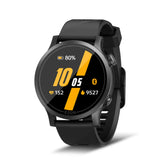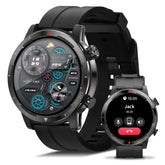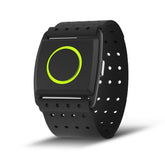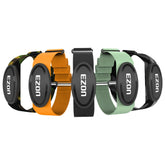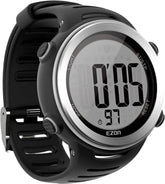The ABCs of Calorie Burn in Exercise and Fitness Planning
Understanding calorie expenditure during exercise is pivotal for designing effective fitness programs, whether your goal is fat loss, endurance building, or athletic performance. With advancements in sports wearable technology like the EZON sports watch, tracking and optimizing calorie burn has become both precise and actionable. Below, we dissect the science of calorie dynamics and provide strategies to integrate this knowledge into your fitness regimen.
Key Factors Influencing Calorie Burn
1. Exercise Type & Intensity
HIIT vs. Steady-State:
HIIT (e.g., sprint intervals) burns 25–30% more calories post-workout via excess post-exercise oxygen consumption LISS (e.g., jogging) prioritizes fat oxidation but requires longer duration for equivalent total burn.
Strength Training:
While weights burn fewer calories during sessions, muscle growth elevates basal metabolic rate (BMR) by 5–10% per kg of added muscle
2. Physiological Variables
Body Composition:
Muscle mass increases resting energy expenditure—1 kg muscle burns ~13 kcal/day vs. 4.5 kcal/kg fat.
Fitness Level:
Trained athletes adapt to burn fewer calories for the same activity, requiring progressive overload.
Gender & Age:
Men typically burn 10–20% more calories due to higher muscle mass; metabolic rate declines ~3% per decade post-30.
3. Environmental & Behavioral Factors
Thermogenesis:
Cold environments increase calorie burn (e.g., winter running adds 7–15% expenditure).
Nutritional Status:
Low glycogen stores force the body to metabolize fat but may reduce workout intensity.
Science-Backed Strategies for Fitness Planning
A. Periodized Training for Metabolic Adaptation
Phase 1 (Fat Loss):
Combine HIIT (3x/week) with resistance training to preserve muscle. Use a calories burned calculator to ensure a 15–20% daily deficit.
Phase 2 (Endurance):
Focus on zone 2 cardio (60–70% max HR) for 45+ minutes to enhance mitochondrial efficiency.
Phase 3 (Performance):
Integrate sport-specific drills with carb-cycling to fuel high-intensity efforts.
B. Nutrient Timing & Calorie Partitioning
Pre-Workout:
Consume 20–30g carbs + 10g protein 30–60 minutes pre-exercise to optimize glycogen stores
Post-Workout:
Prioritize protein (0.4g/kg body weight) within 30 minutes to reduce muscle breakdown.
C. Recovery Optimization
Sleep:
<7 hours sleep reduces leptin (satiety hormone) by 18%, increasing hunger-driven calorie intake
Active Recovery:
Low-intensity yoga or swimming increases blood flow, aiding nutrient delivery without overtaxing metabolism.
EZON Sports Watch: Precision Calorie Management
The EZON sports watch leverages multi-sensor fusion and AI to refine calorie tracking beyond generic formulas:
Dynamic Calorie Adjustment
Combines real-time heart rate, motion acceleration, and skin temperature to adjust burn estimates.
Example: Detects shivering during cold-weather runs, adding 12% to baseline calculations.
Metabolic Efficiency Scoring
Rates workouts by how effectively they utilize fat vs. carbs (e.g., a score of 85+ indicates optimal fat oxidation).
Smart Hydration & Nutrition Alerts
Syncs with sweat loss data to recommend electrolyte intake, preventing dehydration-induced metabolic slowdown.
Adaptive Fitness Plans
Auto-adjusts daily calorie goals based on sleep quality, stress levels, and workout recovery metrics.
Case Study: Integrating Tech & Science
Scenario: A marathoner aims to shed 3% body fat without losing speed.
EZON Intervention:
Uses Race Readiness Algorithm to balance calorie deficit (-500 kcal/day) with glycogen preservation.
Alerts to reduce HIIT frequency when HRV drops below baseline (indicating overtraining).
Recommends pre-long run meals rich in slow-digesting carbs (e.g., oats + almond butter).
Future Trends in Calorie Tracking
Non-Invasive Glucose Monitoring (2026):
EZON prototypes will link blood sugar trends to calorie utilization patterns, refining carb intake timing.
Genomic Integration:
DNA-based insights into carb/fat sensitivity for personalized macro splits.
Final Takeaways
Calorie burn is not a static metric but a dynamic interplay of biology, behavior, and environment. By pairing evidence-based training principles with sports wearable technology like the EZON sports watch, athletes can transform raw data into actionable strategies—turning every heartbeat, step, and sweat droplet into a calculated move toward their goals.
